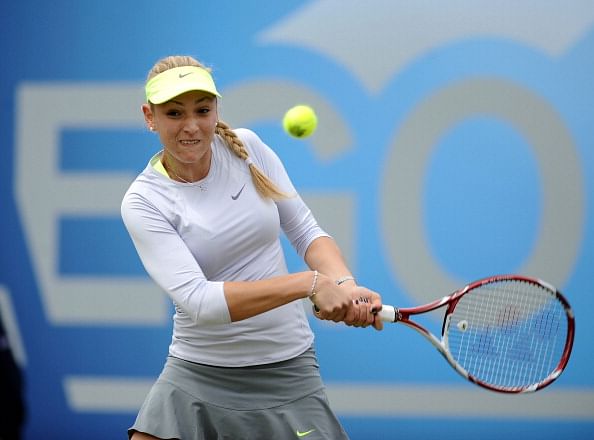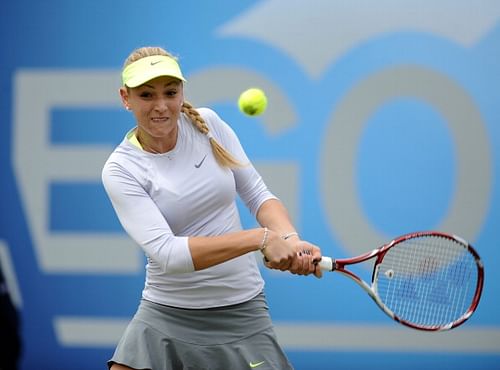
Vekic's coach keeps golden girl grounded on path to top

The coach of Donna Vekic is making sure the latest golden girl of women’s tennis keeps focused after bursting into the limelight after reaching Sunday’s final in Birmingham.
Vekic, a 16-year-old London-based Croatian, reached her first grass court final here and will make her Wimbledon debut in a week’s time.
During these important few days she will receive reminders of how to avoid the pitfalls en route to the top ten – offered by a man who knows about them.
He is David Felgate, who made his name helping Tim Henman, a fellow Englishman, reach the world’s top four, and who has coached Vekic since she was 11.
“The aspirations of the family are to go to the top, and she may say she wants to win a Slam,” Felgate says. “I am happy with that but it’s all about what she does now.
” I can say she is outstanding in her heart and her head. She likes coming to the net, but she’s not good enough to do that all the time.
“I can tell you she has a big forehand and will have a big serve, and that she is working on her movement. She needs to move better.
“It’s great that there’s this success but really it’s all about what she tries to do now and how she keeps practising.”
Felgate is seeking to prevent the intelligent and photogenic teenager doesn’t get ahead of herself amidst the attention which both her looks and her aggressive tennis skills may well generate.
Comparisons have already been made with Maria Sharapova who made her first mark here when she was only 16 and went on to win the Birmingham and the Wimbledon titles within three weeks of each other.
This is heady stuff, motivating Felgate to ensure Vekic keeps her mind on her day-to-day work, while not blocking out the sponsorship opportunities which in due course may multiply.
Felgate admits he was unhappy with Vekic during her semi-final with former champion Magdalena Rybarikova last week, and had a real go at her during a rain break.
“I wasn’t happy with her attitude, so I went out there,” Felgate said. “That’s something I normally don’t do. And I told her in no uncertain terms what I thought.
“She took it on the chin. She hit ten serves to get that right. Then I said to her that I don’t mind if she loses now: I just need a performance.”
Vekic went on to win that match. However her loss in the final to Daniela Hantuchova, having twice been within two points of the first set, and going a break of serve up in the second, was a reminder that both mentally and technically there is work to be done.
Felgate is concerned to make adjustments to the Sharapova comparison.
The media has slightly got her wrong, where her age is concerned,” he says.
“Sharapova’s birthday is a few months before Donna’s. Donna will be 17 at Wimbledon, so if Donna is to be compared with Sharapova she has to be winning Wimbledon this time, not next year. And in my wildest dreams I can’t see that. I will just be happy if she wins a round at Wimbledon.
“You can’t influence what the headline writers write. But still Sharapova is a pretty good person to look up to. You have got to love her steely determination and her mind.”
There are other possible pitfalls besides over-glamorous comparisons. Donna is still doing school work, and her parents are concerned that she does not neglect her studies for a while yet.
Although today she leapt 25 ranking places to number 64, future weeks will introduce her to opponents with different styles of play, which may present new and awkward challenges.
Vekic has reached this relatively exalted position after only 21 matches on the WTA Tour, a very small number, and reaching just two finals, neither of which she has won. She knows she needs to improve the speed and physicality of what at the moment is a rather one-dimensional attacking game.
“If you ask her she will probably say she wants to win Wimbledon, and I am just happy to work towards that,” Felgate emphasises. “That’s what I want to do and what I want her to do.”